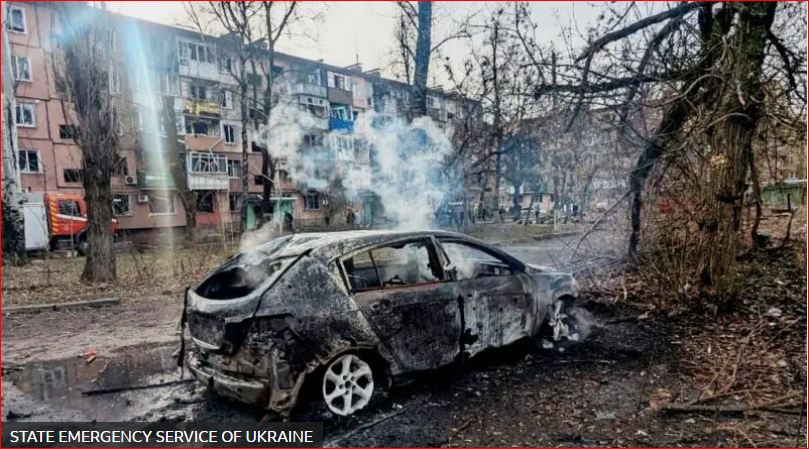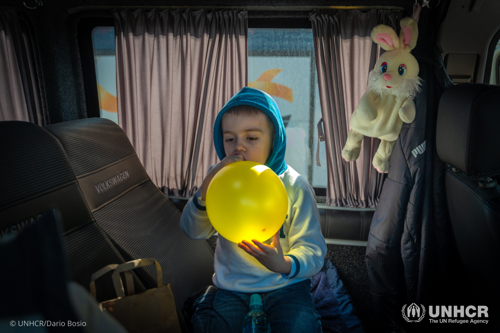5 Things You Should Know About the War in Ukraine

The full-scale invasion of Ukraine began on February 24, 2022, and has displaced millions of Ukrainian families in the country and across the region, triggering the biggest and fastest growing refugee crisis in Europe since the Second World War. More than three years later, 10.6 million Ukrainians have been forced from their homes to other parts of the country or neighboring countries in Europe and beyond. As the war continues, it is crucial to understand what is happening on the ground and how you can help. Here are five things you need to know about the ongoing war and the situation in Ukraine.
1. When did the war in Ukraine begin?
The war in Ukraine began on February 24, 2022 following the Russian Federation’s large-scale invasion of Ukraine. The situation in Ukraine rapidly deteriorated as fighting, heavy shelling, missile and rocket attacks occurred in several regions throughout the country. The death, devastation and destruction inside Ukraine have been staggering—forcing millions of Ukrainians to flee.
The war in Ukraine comes on the heels of almost eight years of active fighting in Ukraine which has profoundly impacted the lives of millions of people. At least 2.9 million people living in the conflict-affected regions of eastern Ukraine were already in need of humanitarian assistance before the war began. The ongoing war has only deepened humanitarian needs in the frontline regions of the country.
2. Who is impacted by the ongoing war in Ukraine?
Nearly a quarter of Ukraine’s pre-war population have been forced to flee their homes to safer areas in Ukraine or neighboring countries in Europe and abroad. As the war continues, humanitarian needs are multiplying and spreading. An estimated 12.7 million people in Ukraine will need humanitarian assistance in 2025.
People in Ukraine face targeted attacks and shelling on civilian and other energy infrastructure, resulting in the tragic loss of life and exacting a cruel toll on the population during winter. Ukrainians are unable to meet basic needs and have difficulties accessing water, electricity, heating, healthcare, education and social protection. More than 2.5 million homes, or 13 percent of the housing stock, has been damaged or destroyed, forcing many Ukrainians to live in damaged homes or in buildings ill-prepared for life-threatening freezing temperatures.
Particularly vulnerable groups include older people and people with disabilities who may be unable to flee from high-risk areas. Women and children are at grave risk of gender-based violence and sexual exploitation and abuse.
3. Who is fleeing Ukraine and where are they going?
Since the war began more than three years ago, 6.9 million people have fled Ukraine and crossed borders into neighboring countries in the region including Poland, Hungary, Moldova and other countries across Europe. Poland has seen the largest influx of Ukrainian refugees with approximately 1 million hosted in Poland.
The majority of the people fleeing Ukraine are women and children who account for approximately 76 percent of refugees. Of Ukraine's 3.7 million IDPs, more than half are women and girls, which is one of the highest percentages of women and girls represented in IDP situations globally. Women face significant challenges and are at the greatest risk for sexual exploitation and abuse, human trafficking and forced prostitution. Given the high protection risks, UNHCR staff are in neighboring countries carrying out regular protection monitoring at border crossing points and transit centers to assess protection risks.
The war in Ukraine has generated an unparalleled outpouring of global solidarity and support. As the war and displacement continue, and until refugees can safely return home, Ukrainian refugees must be assured of adequate protection, access to education and self-reliance.

4. How is the war in Ukraine impacting the rest of the world?
Beyond the direct impacts the war is having in Ukraine and on its neighbors, the war has also caused ripple effects across the world. Ukraine supplies a significant portion of the world’s agricultural commodities including wheat, barley, corn and sunflower. As the war in Ukraine continues, it is causing supply chain disruptions globally and increasing the price of food, fuel and other commodities.
Displaced people living in already vulnerable situations are at risk of gender-based violence and other forms of abuse. UNHCR, the UN Refugee Agency, saw an unprecedented $700 million funding gap in the first year of the war in Ukraine, placing great strain on operations in Uganda, the Democratic Republic of the Congo, Sudan, Iraq, Ethiopia and other countries in dire need of support.
5. What is UNHCR, the UN Refugee Agency, doing to help?
UNHCR has been working in Ukraine since 1994, alongside local authorities, partners and community organizations to deliver protection and humanitarian assistance to people in need and remains on the ground to help now.
Since the start of the war, UNHCR has delivered over 410,000 emergency shelter kits and materials in the immediate aftermath of attacks, provided psychosocial support to around 300,000 affected people, and repaired more than 37,000 war-damaged homes.
UNHCR also supports people who have recently been displaced or evacuated from intensified hostilities in frontline regions, finding them secure temporary shelter, supplying essential household items and providing cash assistance to cover the cost of food, medicine, rent and other vital expenses for the initial period of displacement.
Legal and psychosocial support provided by UNHCR helps displaced people and refugees restore their essential identity documents and recover from the trauma of the war and the experience of being forced to flee.
What can you do to help?
More than three years since the war in Ukraine began, one-third of Ukraine’s population are in desperate need of humanitarian aid. As the war continues and humanitarian needs grow—your compassionate support is needed to help provide emergency supplies, lifesaving care and protection to families who are fleeing for their lives. You will help children, women and men displaced by violence in Ukraine know they are not alone at the most devastating moment of their lives. Make a compassionate donation today.
16.03.2025 04:56
 Latest news
Latest news Latest news
Latest newsGreece Plans to Exclude Turkiye from Future Defense Contracts
20.Feb.2026
U.S.-Based Mars Launches Major Investment Project in Kazakhstan
20.Feb.2026
Parliamentary Elections 2026 in Armenia as a Geopolitical Referendum
20.Feb.2026
Russia and Ukraine Fail to Reach Agreement in Geneva
19.Feb.2026
The South Caucasus in U.S. Foreign Policy: Implications of High-Level Visits for Russian and Chinese Regional Aspirations
18.Feb.2026
Ukraine Imposes Personal Sanctions on Belarusian President Alexander Lukashenko
18.Feb.2026
72% Against the Authorities: Economic Dissatisfaction Hits Record Levels in Turkiye
17.Feb.2026
Bulgaria Strengthens Defense: First American Stryker Vehicles Delivered
17.Feb.2026
Moscow Criticizes Plans to Build a U.S.-Backed Nuclear Power Plant in Armenia
16.Feb.2026
Washington expects Tbilisi to strengthen ties amid regional changes
15.Feb.2026

 28 Feb 2026
28 Feb 2026









